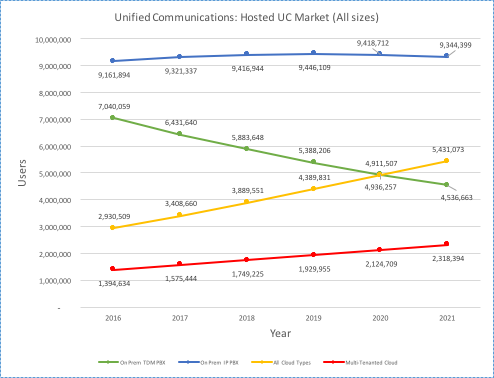On-Premise communications sales are declining. However you frame it, the shift from in-house and owned platforms to alternative hosted options is no longer wishful thinking.

Take a look at the graph above, which shows the most recent round of MZA research – focusing across the next 5 years.
Legacy systems (Green Line) are clearly going into freefall, dropping roughly 2.5m seats (that’s a CAGR of -8%). Less dramatically, but no less interesting is the more subtle reversal of On-premise IP PBX system sales (Blue line), which are expected to plateau around 2019 and decline thereafter.
Hosted cloud communications (Yellow line) on the other hand, is expecting a steady rise of approximately 2.5m seats – essentially mapping directly to the decline of traditional TDM systems. Which makes some sense, as recent attitudes toward CapEx and Services heavy IP PBX systems has significantly cooled, so a jump past these to an OpEx focused and light touch hosted alternative is more attractive.
And whilst Hosted Cloud is expected to see the fastest growth, Muliti-tenanted Cloud (Red line) is also in the ascendance., with an estimated 1m new seats across the same timeframes.
So why are we seeing this now? There will be many factors influencing this change, and here I’ve listed nine of the more likely ones:
Minimal upfront investment
Traditional models have almost always involved significant front-end costs. Hosted solutions require minimal or no on-site hardware and infrastructure, resulting in little upfront investment, favouring finance friendly ‘pay-as-you-go’ subscription models. Furthermore, with many legacy, premise based telephony platforms, adding new functionality or flexibility can be expensive, making any realisable benefits that much harder to justify.
Ongoing in-house costs
Having expensive hardware on site is a thing of the past; businesses are turning to outsourced models to reduce Capex, which in turn eliminates expensive installation, maintenance and support costs. Equally, there is no requirement for costly in-house technical expertise, cutting out additional manpower and training overheads.
Predictable budgeting
A predictable budget makes financial and business planning simpler and makes managing the operational process easier. When the company does grow, which requires incremental costs, the ability to accurately predict those additional costs based on employee growth model is a big help.
Evergreen model
A hosted system won’t go out of date. The hosting partner ensures that the technology is updated automatically giving you the latest features, services, patches and benefits without you needing to add any new hardware, software or licensing.
Risk is owned elsewhere
A good hosted solution will be backed up by a solid SLA. By its nature, the SLA helps a business reduce its risk by offsetting the service level against a third party who’s prepared to own it.
Changing how people work
One of the biggest advantages of UC is this shift in dependency from the physical bricks and mortar of the office. UC caters to the perfect idea of hyper-mobility by giving access to the office via a range and multitude of devices; smartphones, PCs, laptops, tablets and even dongles. Employees are able to create their office environment anywhere they please – and work just as effectively and securely.
Licensing complexity
Anyone who has ever been involved in deploying a traditional PBX solution will understand the licensing complexity involved for servers, functionality, maintenance and of course users. Hosted solutions on the other hand, typically charge a simple per-user license fee.
Reliability and business continuity
In the event of an emergency or disaster, the hosting partner can easily adapt to your changed situation without additional expense on your part.
Most companies have a Disaster Recovery Plan in place to ensure that data and records vital to the operation of the business are duplicated or protected in an off-site storage facility. UC provides the ability to ensure that business communications are also protected in the event of an emergency and can be incorporated into the overall Disaster Recovery Plan.
ISDN retirement
Last, but certainly not least is the open knowledge that the days of ISDN are numbered. BT has signalled that ISDN will be switched off in 2025, but more realistically the ability to buy new ISDN circuits will have ceased well before that. Current thinking is that sales will end somewhere around 2020. With only 3 years to this first milestone, the move from a legacy TDM system to a SIP-supported hosted platform, bypassing on-premise IP systems altogether is a highly credible one.
Like the IP PBX before it, hosted communications will become the dominant business platform of choice over time. Can I be so sure? Possibly not, but I recall the early 2000’s when Cisco (through its acquisition of Celsius) almost singlehandedly took on the TDM industry, and nearly all of the industry shrugged it off as a fad. We all know how that turned out.







